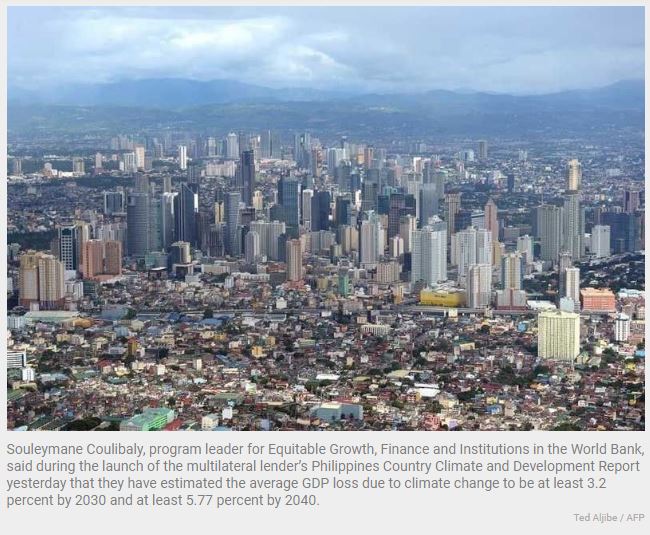Philippines: Climate change economic damage may hit 7.6% of 2030 GDP
MANILA, Philippines — Economic damage to the Philippines could reach up to 7.6 percent of gross domestic product by 2030 and by 13.6 percent of GDP by 2040 if no action is taken to address climate change, according to the World Bank.
Souleymane Coulibaly, program leader for Equitable Growth, Finance and Institutions in the World Bank, said during the launch of the multilateral lender’s Philippines Country Climate and Development Report yesterday that they have estimated the average GDP loss due to climate change to be at least 3.2 percent by 2030 and at least 5.77 percent by 2040.
“GDP would be lower by that much if climate change is left unaddressed,” said Ndiame Diop, World Bank country director for Brunei, Malaysia, the Philippines and Thailand.
The World Bank used historical typhoon information in coming up with the estimates. Citing the World Risk Index for this year, Diop said the Philippines ranks first among countries most affected by extreme weather events globally.
Based on the World Bank’s report, he said climate change would continue and accelerate, with temperatures in the country seen to continue to increase by about one to two degrees Celcius by the end of the 21st century, rainfall patterns to change and intensify, and extreme events expected to become stronger and more frequent.
“Without action, climate change will impose substantial economic and human costs, affecting the poorest households the most,” he said.
While climate change poses a threat, Coulibaly said adaptation actions could reduce the economic losses by around two-thirds.
He said faster declines in poverty and economic insecurity would also be seen with the implementation of climate adaptation measures.
Climate mitigation actions, meanwhile, would provide benefits, including lower electricity costs, reduced air pollution and increased agricultural productivity.
“Our simulations show the overall economic impact of the mitigation measures up to 2040 is likely to be small, but potentially positive, with around 0.5 percent increase in GDP and can generate about 80,000 jobs by 2040,” he said.
As the country is already taking action on climate change, World Bank senior environmental economist Stefano Pagiola said what needs to be done is to improve implementation and scale up activities.
To avoid making the problem worse, he said the country should not continue to build in areas known to be at risk of flooding, storm surges or sea level rise.
He said there is also a need to improve the coordination of climate actions at all levels of government, enhance the capabilities of local government units (LGUs) to design and implement climate actions, and focus on effective implementation of existing plans and regulations.
“As investments will need to be made, undertaken by the private sector or by individual firm households, making sure that the incentive is right is crucial,” he said.
He stressed the importance of making sure there are no regulatory obstacles, and private sector actors have access to financing, technical assistance and a trained workforce.
In addition, he said the country must avoid one-size-fits-all approaches, and implement climate actions that address both extreme and slow onset events, as well as take poverty and vulnerability into consideration to help the poor and vulnerable manage the risks posed by climate change.
Socioeconomic Planning Secretary Arsenio Balisacan said it is necessary to integrate climate action in the Philippines’ development plans, with the country subject to adverse weather conditions.
“We suffer through excessive rainfall that endangers us to flash floods and landslides and causes damage to our sources of food, shelter, and livelihoods. With greater uncertainties being introduced to us by climate change, we can also expect more droughts and, consequently, more future water and food crises to affect the country,” he said.
He said the upcoming Philippine Development Plan for 2023 to 2028, which will serve as the country’s overall development blueprint for the medium term, will include priority actions such as carbon pricing and incentivizing LGUs to focus on more climate-friendly projects such as electric vehicles, sustainable tourism, biodiversity protection, and energy efficiency, to achieve a greener economy.
To effectively implement policies at the LGU level, Makati Mayor Abigail Binay said there needs to be a national policy, which can be done by revisiting Republic Act 10121 or the Disaster Law to include mitigation and resilience.
“The thing is, when you are an LGU, you have a discretion which programs you will prioritize unless there’s a national policy making it a requirement,” she said.
For her part, Metro Pacific Investments Corp. chief finance officer and chief sustainability officer June Cheryl Cabal-Revilla said there is a need to address constraints to private sector participation in climate action.
She said incentives and access to financing are important for the private sector.
Moreover, she said there should be “updated, clear, consistent regulations, which would consistently be applied whoever our leaders are.”
She also cited the need for capacity building on both national and LGUs.
Source: https://www.philstar.com/business/2022/10/26/2219268/climate-change-economic-damage-may-hit-76-2030-gdp


 English
English




